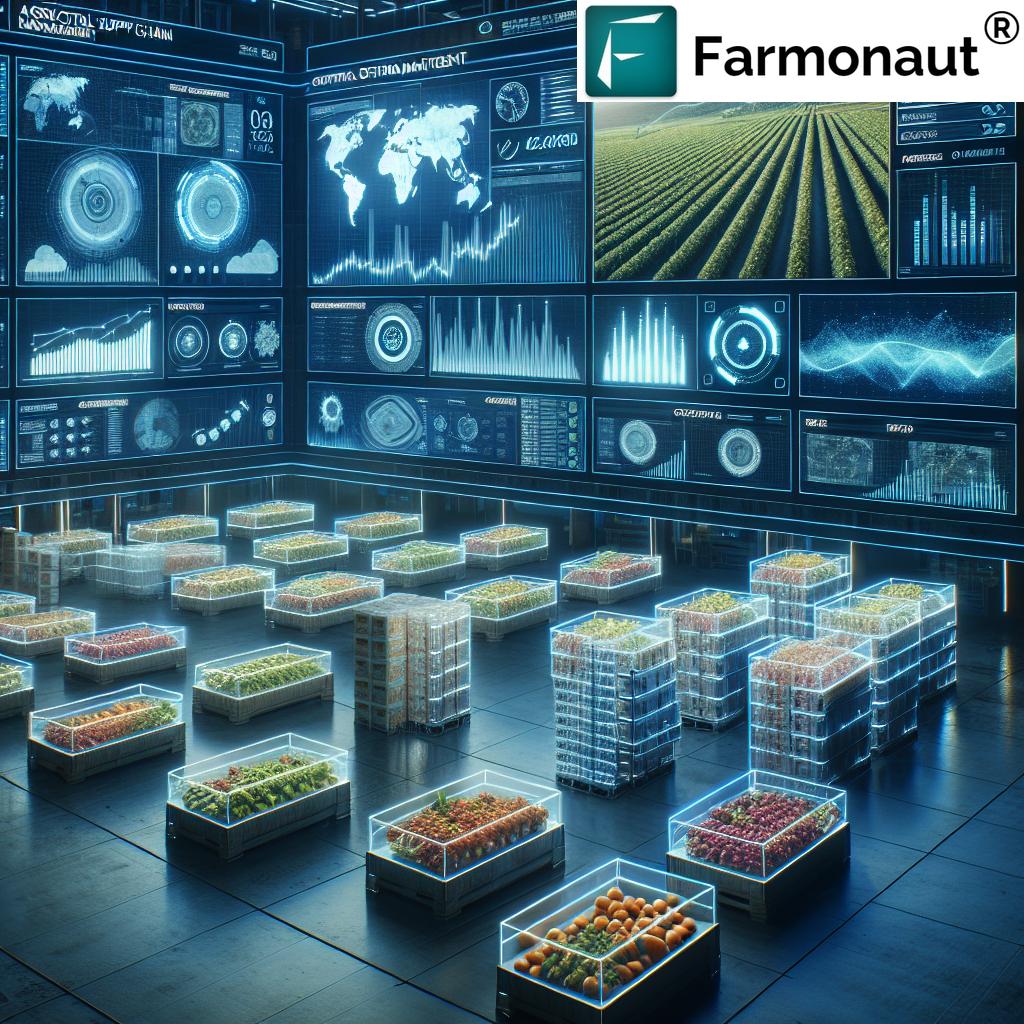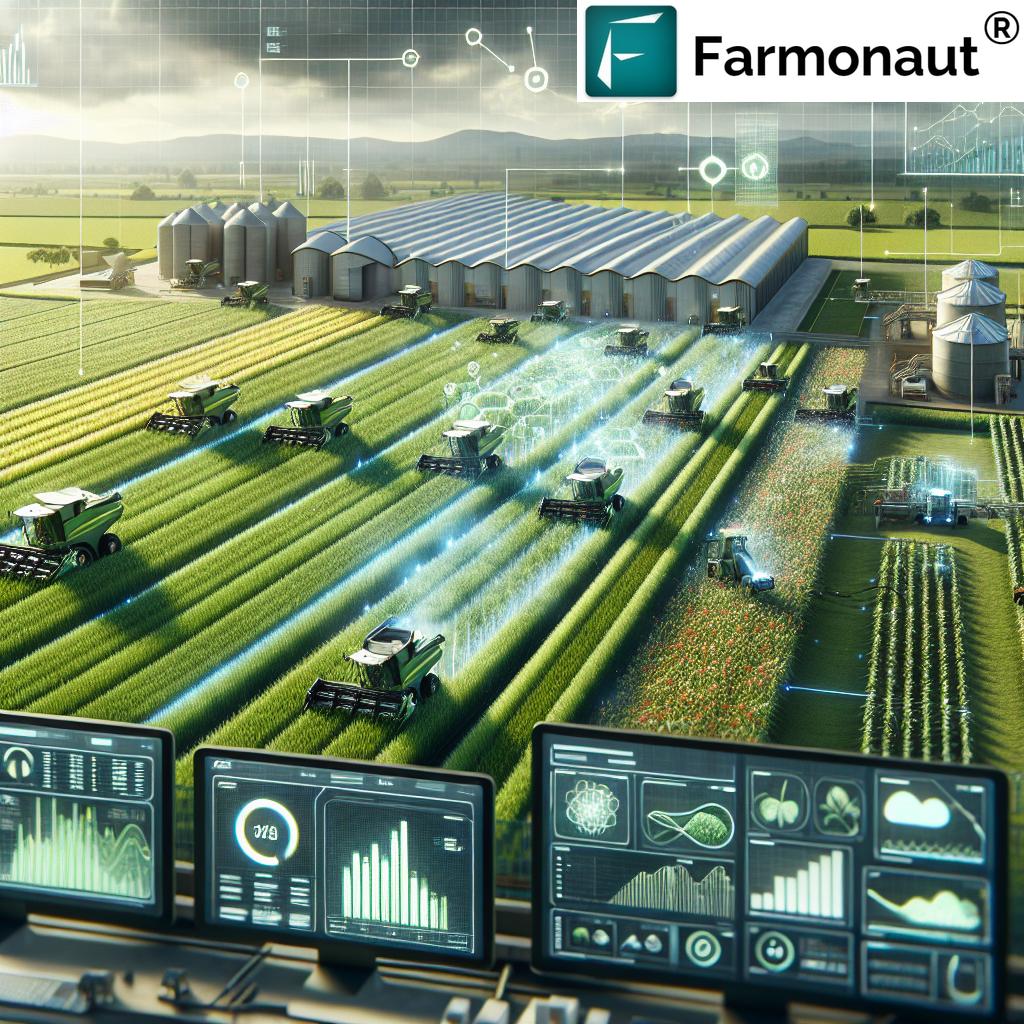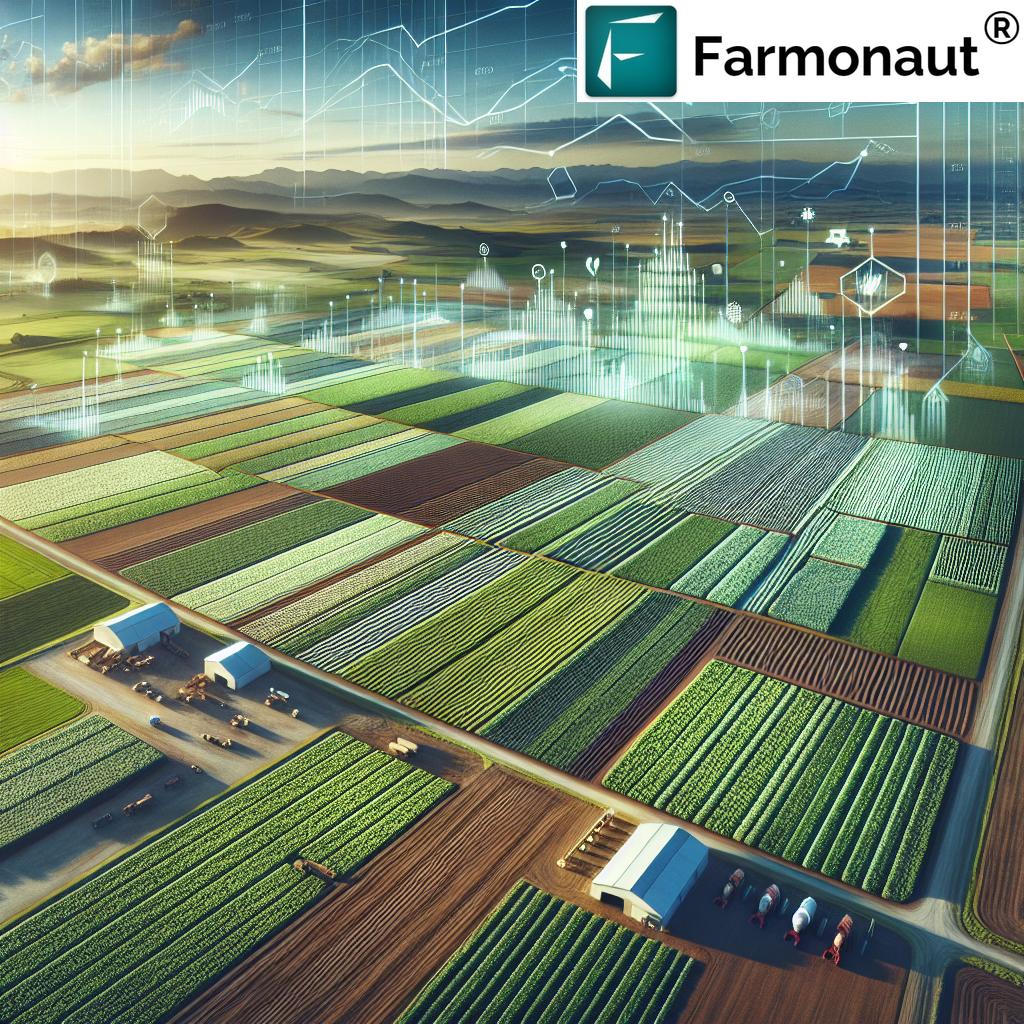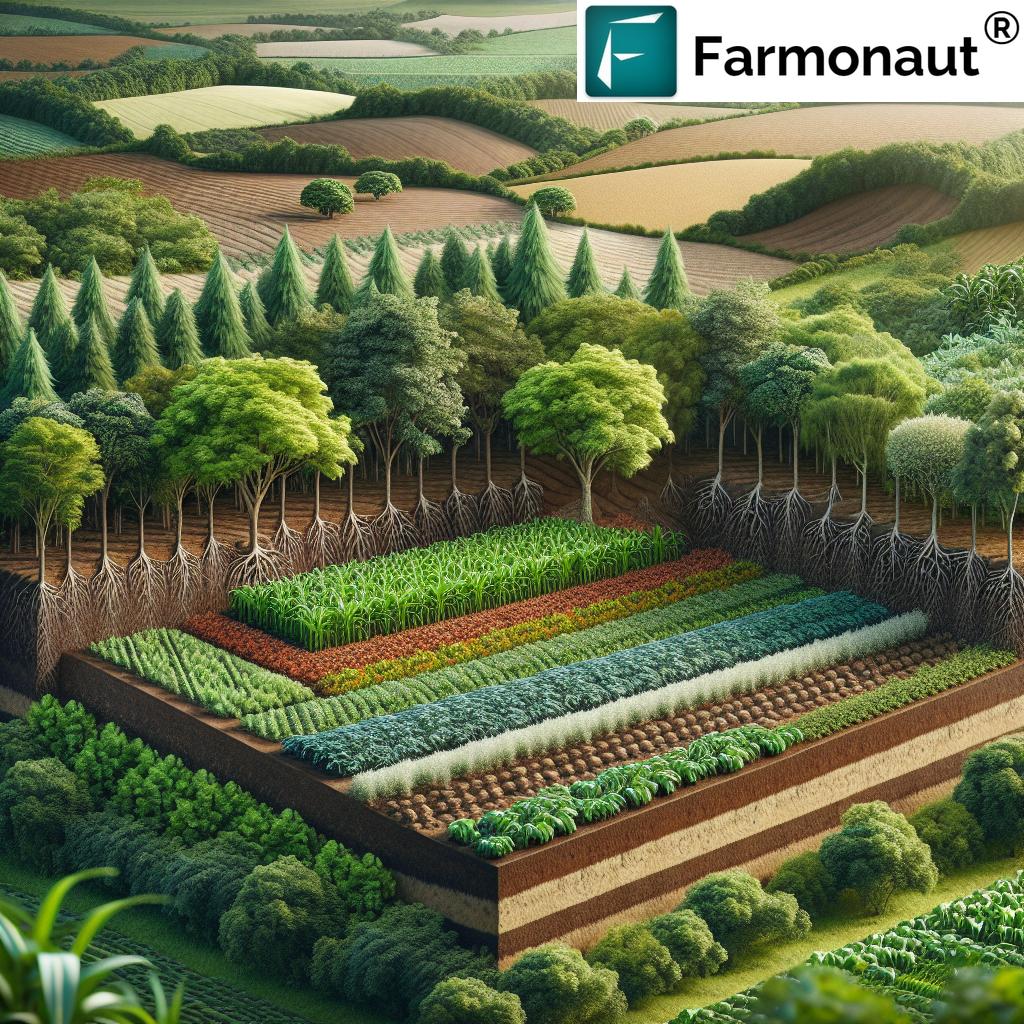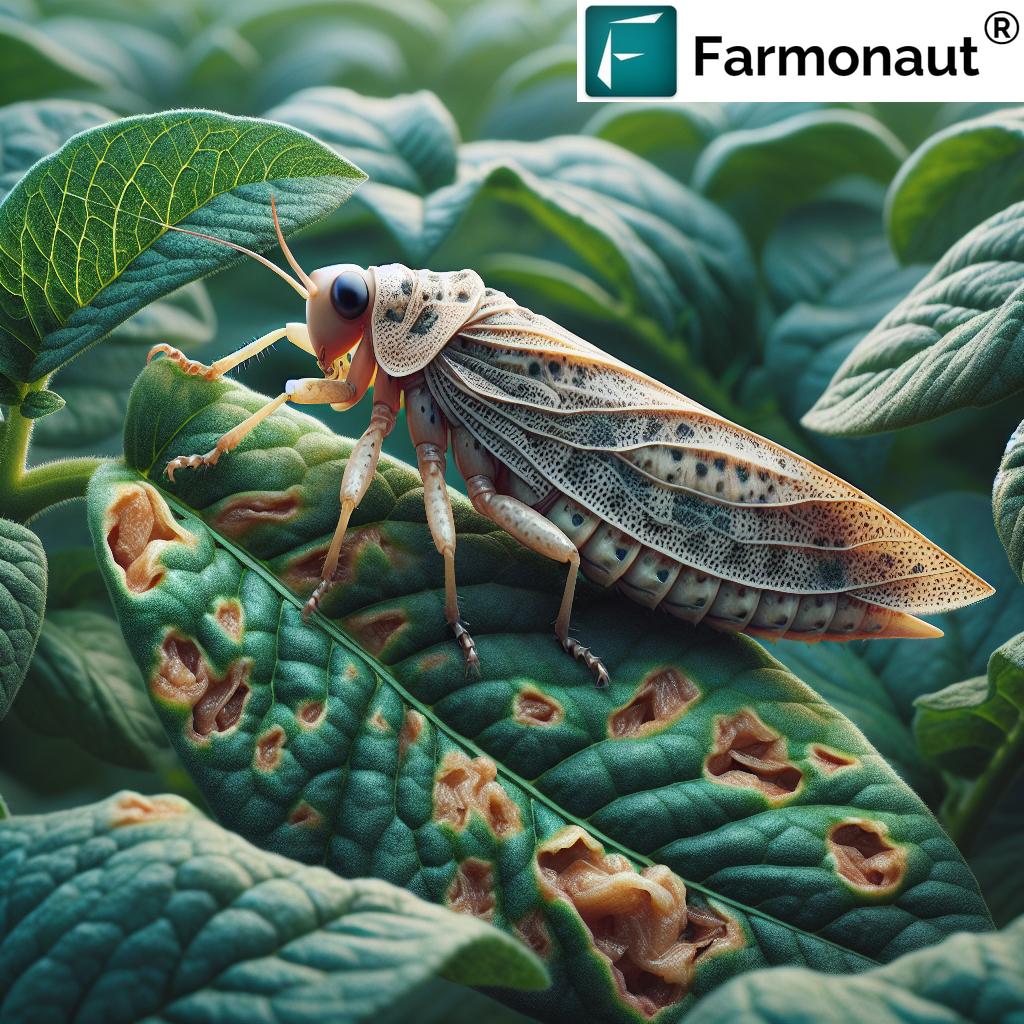Table of Contents
- Introduction
- Challenges in Agricultural Supply Chains
- 7 Game-Changing Agriculture Supply Chain Solutions
- Internet of Things (IoT) in Agriculture
- Artificial Intelligence & Machine Learning
- Blockchain Technology and Transparent Ledger Solutions
- Digital Twins for Optimization
- Collaborative & Digital Agriculture Platforms
- Satellite-Based Analytics & Agricultural Data Platforms
- Carbon Footprinting & Sustainable Resource Management
- Comparative Solutions Impact Table
- Benefits of Technological Integration
- How Farmonaut Accelerates Digital Transformation in Agriculture Supply Chains
- Frequently Asked Questions
- Conclusion
7 Game-Changing Agriculture Supply Chain Solutions
Agricultural supply chains form the backbone of our global food networks, connecting farms to consumers through intricate webs of production, processing, distribution, and consumption. Efficiently managing these supply chains is crucial—not just for reducing waste, ensuring food security, and meeting regulatory standards, but also for promoting sustainability and long-term resource management. As stakeholders across the agriculture sector strive for more reliable, resilient systems, the demand for innovative solutions grows ever stronger.
With the advent of advanced technological solutions—including AI in farming, blockchain for agricultural products, and the Internet of Things in agriculture—the landscape of agricultural supply chain management is undergoing a profound transformation. These digital tools enhance efficiency, transparency, and sustainability, bridging gaps from farm to table and beyond. In this comprehensive guide, we explore the most game-changing innovations empowering farmers, agribusinesses, and consumers alike.
Challenges in Agricultural Supply Chains
Managing agricultural supply chains has always been fraught with complexities. Diverse production conditions, highly perishable goods, and dynamic markets create numerous hurdles for those seeking to guarantee the steady flow of high-quality food products. Let us outline the core challenges faced by modern agricultural supply chains:
- Weather Variability: Unpredictable weather patterns can wreak havoc on planting schedules, crop yields, and overall product quality. This is especially true in regions with increasing climate uncertainty.
- Logistical Complexities: Coordinating the movement of perishable foods and other goods over vast distances requires tight timing, temperature control, and careful oversight to reduce spoilage and maintain quality.
- Market Fluctuations: Rapid price changes due to demand shifts, input costs, or policy changes impact the profitability of farmers and related stakeholders.
- Regulatory Compliance: Adhering to evolving food safety standards, sustainability regulations, and traceability mandates is essential but often complicated and time-consuming.
- Data Fragmentation: Access to unified, reliable agricultural data is still a challenge, making decision-making, risk management, and compliance monitoring difficult.
- Waste & Loss: Inefficient processing, storage, and transport lead to massive food loss—a sustainability and food security crisis affecting millions.
Addressing these interconnected challenges requires more than incremental changes—it demands the adoption of advanced, integrated technologies, big data analytics, and a new approach to digital transformation in agriculture.
7 Game-Changing Solutions for Agricultural Supply Chains
Technological advancements have recently introduced a host of innovative solutions aimed at addressing agricultural supply chain challenges. Let’s dive deep into the seven most significant technologies and see how their integration is transforming supply chains for better efficiency, traceability, and sustainability.
1. Internet of Things (IoT) in Agriculture Supply Chains
The Internet of Things in agriculture enables connectivity through a dense web of smart devices, sensors, and GPS trackers deployed across farms, logistics fleets, and warehouses. Their role in agricultural supply chain management is evolving rapidly. Here’s what IoT contributes:
- Real-time Data Collection: Sensors monitor soil conditions, crop health, environmental variables, and equipment performance, offering near-instant analytics for everyday decisions.
- Enhanced Logistics: GPS-enabled trackers and temperature/humidity sensors help managers maintain optimal conditions during transport, minimizing spoilage and improving food safety.
- Efficient Resource Management: With insights on irrigation, fertilization, and equipment usage, resource waste is dramatically curtailed, supporting environmental sustainability.
- Traceability and Transparency: Each stage of the supply chain produces its own data trail, boosting farm to table transparency and traceability—crucial for both regulatory compliance and consumer trust.
An excellent example of leveraging IoT is Farmonaut’s Fleet and Resource Management system. This service utilizes GPS and real-time data to optimize logistics, vehicle usage, and safety protocols, ensuring the swift and secure movement of agricultural goods.
2. Artificial Intelligence (AI) & Machine Learning in Supply Chains
AI in farming and machine learning are revolutionizing agricultural supply chain processes—from planning and on-field management to transportation and retail. Here’s how these powerful technologies are changing the game:
- Predictive Analytics: AI-powered algorithms analyze big datasets (soil, weather, supply/demand) to forecast crop yields, optimize planting and harvesting schedules, and predict supply chain disruptions.
- Risk Mitigation: Machine learning models help identify early signs of disease or pest outbreaks, so farmers can implement proactive measures—reducing losses and enhancing overall food security.
- Operational Optimization: AI systems streamline resource allocation (e.g., targeted irrigation/fertilization), thus improving crop yields with technology and reducing unnecessary input costs.
- Enhancing Decision-Making: From aggregation to processing and distribution, AI-assisted supply chains are nimbler, more responsive to market fluctuations, and more resilient to external shocks.
For example, Farmonaut’s Jeevn AI Advisory System harnesses satellite and IoT data to give farmers real-time, personalized guidance on weather, cropping, and input management. This level of intelligence significantly boosts both efficiency and profitability.
3. Blockchain for Agricultural Products: Enabling Transparent Ledgers and Food Traceability
Blockchain for agricultural products uses secure, transparent digital ledgers to record every transaction or movement within the supply chain. The result is unparalleled transparency and trust:
- Immutable Records: Every step—from planting to distribution—receives a timestamped entry, protecting against data tampering and fraudulent claims.
- Traceability: Blockchain underpins cutting-edge food traceability technologies, providing stakeholders and consumers with reliable data on a product’s origin, journey, and quality.
- Streamlined Regulatory Compliance: Because all transactions are visible and verifiable, audits and compliance with evolving standards become far simpler and more cost-effective.
- Building Consumer Trust: “Farm to table transparency” is enhanced, crucial for organic, fair-trade, and specialty goods where provenance defines value.
Farmonaut’s Blockchain Product Traceability module exemplifies this approach. It employs blockchain to deliver tamper-proof records and verifiable histories for agricultural and food-related products, uniquely positioning brands to meet stringent consumer and regulatory demands.
4. Digital Twins: Simulating and Optimizing Supply Chain Processes
Digital twins are virtual, real-time replicas of physical assets—be it a farm, warehouse, or delivery vehicle—allowing us to simulate and optimize supply chain processes:
- Problem Prediction: These systems predict equipment failures, crop disease spread, or bottlenecks, letting supply chain managers act ahead of disruptions.
- Optimized Routing: Logistics teams use digital twins to simulate various routes, analyzing time, cost, fuel, and climatic factors in order to choose the best path.
- Efficiency Gains: With continuous simulation, decisions can be made to fine-tune input use, harvest timing, and transportation—minimizing waste and maximizing yield or product quality.
By coupling digital twins with live IoT and satellite data, even large-scale agribusinesses can create detailed “command centers” for real-time monitoring and scenario planning.
5. Collaborative and Digital Agriculture Platforms
Modern digital agriculture platforms disrupt traditional value chains by connecting stakeholders directly, facilitating efficient transactions, and disseminating vital information:
- Direct Marketplace Access: Farmers bypass intermediaries and reach buyers directly, resulting in fairer pricing and reduced logistic delays.
- Integrated Tools: Features such as inventory management, demand forecasting, and digital payment simplify every stage of the supply chain, ensuring efficient supply chain management.
- Enhanced Data Flow: Aggregating information from all users, these platforms create rich datasets that support supply, demand, and price volatility analysis.
Farmonaut’s suite, accessible via Android, iOS, and Web Apps, makes data-driven, collaborative supply chain management inexpensive and simple. You can manage large-scale farms or bring your products directly to buyers anywhere—empowering farmers and agribusinesses alike.
6. Satellite-Based Analytics & Agricultural Data Platforms
Satellite imagery and agricultural data platforms bring a bird’s-eye perspective, providing vital insights for both daily decision-making and strategic planning:
- Real-Time Crop Health Monitoring: Satellite systems monitor fields for stress, pest outbreaks, and soil moisture through NDVI and spectral indexes, alerting farmers and supply chain operators to take appropriate action.
- Yield Optimization: By analyzing vast geographical and historical datasets, yield forecasts become more accurate, helping stakeholders tailor logistics and marketing strategies in advance.
- Sustainability and Compliance: Remotely-sensed data ensures accurate carbon reporting and compliance with sustainability standards—essential for modern agri-exporters and processors.
Farmonaut’s satellite-based farm management tools fuse satellite analytics with on-ground data, allowing for granular, scalable, and affordable monitoring and reporting across continents. Their data-driven platforms redefine digital transformation in agriculture.
7. Carbon Footprinting & Sustainable Resource Management Solutions
Carbon footprinting technologies enable agribusinesses and farmers to quantify emissions and measure their progress towards sustainable agriculture solutions:
- Environmental Accountability: Monitor and reduce emissions associated with crop production, processing, transport, and storage.
- Regulatory Compliance and Reporting: Reconcile actual emissions with government or buyer-mandated standards, leveraging precise data integration.
- Resource Efficiency: Data-driven guidance on fertilizer, irrigation, and fuel input ensures minimal environmental impact while preserving yield.
- Transparency and Differentiation: Stakeholders who demonstrate sustainability earn greater trust from consumers, investors, and regulatory bodies.
Explore Farmonaut’s carbon footprinting solutions—these enable businesses to comply with global standards, report accurately, and make a tangible difference in the push for sustainable agriculture.
Comparative Solutions Impact Table
| Solution/Technology | Functionality/Description | Supply Chain Stage Affected | Estimated Efficiency Improvement (%) | Sustainability Impact | Example/Application |
|---|---|---|---|---|---|
| Internet of Things (IoT) | Real-time monitoring of soil, crop, environment, and logistics | Production, Storage, Transportation | 15-25% | Reduces water and input waste, improves traceability | Fleet Management, Smart Irrigation Systems |
| AI & Machine Learning | Forecasting yields, optimizing schedules, early risk detection | Production, Distribution | 20-30% | Cuts wastage, boosts input efficiency | AI-Driven Crop Advisory Systems |
| Blockchain Technology | Immutable transaction & traceability ledger | All stages | 10-20% | Promotes transparency, reduces fraud and counterfeiting | Product Traceability Modules |
| Digital Twins | Virtual modeling and simulation for optimization | Production, Transportation, Storage | 20-28% | Enables proactive maintenance, reduces loss | Simulated Harvest Routing |
| Digital Platforms | Direct farmer-to-buyer connection, marketplace tools | Distribution, Production | 15-20% | Cuts inefficiencies, improves pricing fairness | Farm Management & Inventory Apps |
| Satellite Analytics | Remote, real-time crop & soil health monitoring | Production, Planning | 18-27% | Reduces overuse of inputs, enables compliance | NDVI Mapping, Moisture Tracking |
| Carbon Footprinting | Automated measurement & reduction of environmental impact | All stages | 8-16% | Supports sustainable certification, reporting | Carbon Footprint Tracking Solutions |
Explore Flexible Plans for Your Agri Business or Farm Organization
Farmonaut offers scalable, cost-effective subscription plans for both individual farmers and large enterprises. Its platform harnesses precise satellite analytics, AI advisories, blockchain traceability, and much more—empowering informed decisions and streamlined operations at the best market prices.
Key Benefits of Integrating Technology into Supply Chains
By adopting AI, IoT, blockchain, and comprehensive agricultural data platforms, the agricultural sector is experiencing an unprecedented transformation. Here are some of the direct advantages we are seeing with digital transformation in agriculture:
- Greater Efficiency: Automated, data-driven decisions slash redundancy, cut resource waste, and boost overall productivity across all supply chain stages.
- Food Security & Yield Optimization: Predictive models and remote sensing prevent crop failures and maximize yields, promoting robust food supply networks.
- Improved Traceability: End-to-end visibility supports food safety, brand differentiation, and regulatory adherence. This protects consumers and opens international markets.
- Sustainability Gains: Optimized resource use directly supports sustainable agriculture solutions, lowered emissions, and smart environmental stewardship.
- Risk Management: Real-time weather forecasting, crop disease modeling, and robust compliance monitoring shield operations against shocks.
- Enhanced Profitability: Cost savings, waste reduction, and direct access to premium markets substantially boost the bottom line for all stakeholders, from farmers to distributors.
These impacts ripple through the entire agricultural supply chain, from production and processing through to distribution and consumption.
How Farmonaut Accelerates Digital Transformation in Agriculture Supply Chains
Farmonaut stands at the forefront of digital transformation in agriculture— delivering advanced, affordable tools for next-generation agricultural supply chain management. Here’s why Farmonaut is a preferred choice for farmers, agribusinesses, and organizations worldwide:
- Accessible Satellite Monitoring: Acquire NDVI maps, soil moisture analytics, and live crop health data for any plot, anywhere—without expensive on-site sensors.
- AI-Based Crop Advisory: The Jeevn AI Advisory System transforms data into personalized, actionable recommendations for boosting productivity and sustainability.
- Blockchain Traceability: Enjoy easy access to traceability solutions that strengthen transparency, protect product authenticity, and streamline compliance processes.
- Carbon Footprint Tracking: Demonstrate sustainability leadership and comply with global requirements.
- Satellite-Based Crop Loan & Insurance Verification: Empower growers and lenders to process loans and claims with trusted, up-to-date remote sensing data—reducing fraud and speeding up approvals.
- Fleet Management: Coordinate vehicles, manage routes, and minimize fuel or resource waste via real-time insights and logistics automation.
- Large-Scale Farm Management: Administer massive farm portfolios or projects across countries with one simple, unified cloud platform, enabling full supply chain integration.
- API & Developer Tools: Seamlessly ingest Farmonaut’s remote sensing, weather, and prediction data into your own system by leveraging our Open API and detailed Developer Docs.
Whether you’re managing a small farm or a multinational agribusiness, Farmonaut powers data-driven supply chain transformation at scale. It’s available for Android, iOS, and browser—anytime, anywhere.
Frequently Asked Questions (FAQ)
What are agricultural supply chain solutions?
Agricultural supply chain solutions refer to a set of technologies and methods designed to optimize the processes involved in the production, processing, storage, and distribution of food and agricultural products. These can include IoT sensors, AI analytics, blockchain ledgers, satellite imagery, and more—all aimed at increasing transparency, efficiency, sustainability, and food traceability.
How does AI in farming improve supply chain management?
AI and machine learning enhance agricultural supply chain management by analyzing large datasets to forecast yields, anticipate risks, automate decision-making, and optimize resource allocation. The results are more predictable outputs, reduced waste, and higher profitability.
What is the role of blockchain in agricultural supply chains?
Blockchain provides a transparent, tamper-proof record (ledger) of every transaction or movement within the agricultural supply chain. This guarantees traceability, builds consumer trust, and makes regulatory audits or product recalls more efficient and reliable.
How can farmers benefit from satellite-based supply chain monitoring?
Satellite monitoring tools, such as those offered by Farmonaut, deliver real-time insights on crop health, soil moisture, climate risks, and operational inefficiencies. This empowers farmers to adopt timely interventions, maximize yields, minimize input wastage, and maintain detailed compliance records for traceability and insurance.
Are these agricultural technology solutions scalable?
Absolutely. Technologies such as IoT, AI, blockchain, and cloud-based data platforms are modular and highly scalable. They can cater to individual farms, large agribusinesses, or government-scale operations—adapting as needs change and operations grow.
What platforms are available for managing agricultural supply chains digitally?
Farmonaut provides flexible, easy-to-use mobile and web applications suitable for all levels—individual growers, agribusinesses, NGOs, and regulators—integrating satellite data, AI, and blockchain to offer end-to-end supply chain visibility and control.
Conclusion: Pioneering a Transparent, Efficient, and Sustainable Future
Today’s agricultural supply chain challenges demand innovative, robust solutions. With the integration of IoT devices, AI analytics, blockchain traceability, digital twins, and satellite-powered platforms, the sector is moving beyond traditional boundaries towards unprecedented levels of efficiency, food traceability, and sustainable management.
At Farmonaut, we are passionate about making precision agriculture not just affordable, but accessible to every farmer, cooperative, and business—regardless of scale. By leveraging our suite of advanced tools, you can optimize operations, reduce waste, prove your sustainability, and build trust with partners and consumers alike.
The journey towards a digital, data-driven agricultural supply chain is only accelerating. By embracing these 7 game-changing solutions, we all move closer to a world where food is secure, traceable, and grown sustainably for generations to come.
Get started—empower your supply chain operations and unlock your farm’s full potential with Farmonaut today! Try our platform and join the leaders in digital agriculture.

